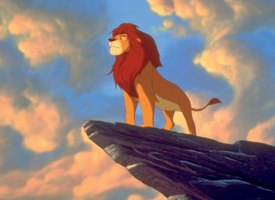From the moment the sun rises over the savanna and we hear the African chant, THE LION KING grips the audience's attention. Combining fable with Greek tragedy, this film has a serious undertone that many Disney animated features do not have. The studio dealt with the death of a parent before, but not like this. This is a world with real consequences, which is the basis to all classic children's tales and what makes this film not just for the kids.

Check Out the Trailer
From the moment the sun rises over the savanna and we hear the African chant, THE LION KING grips the audience's attention. Combining fable with Greek tragedy, this film has a serious undertone that many Disney animated features do not have. The studio dealt with the death of a parent before, but not like this. This is a world with real consequences, which is the basis to all classic children's tales and what makes this film not just for the kids.
The opening calls together all the animals of Pride Rock to witness the presentation of the new male heir of the kingdom — the lion cub Simba (Jonathan Taylor Thomas as child and Matthew Broderick as adult). His father Mufasa (James Earl Jones, STAR WARS) teaches him to be a just ruler. He explains that the circle of life has the lion eating antelope and when they die they help the grass grow, which new antelope will eat. Simba hasn't learned yet that there are creatures out who would kill for other reasons. This is the case with his scheming uncle Scar (Jeremy Irons, REVERSAL OF FORTUNE), who sees his nephew as the boulder in his way to the throne.
Scar conspires to kill off Simba by tricking him to go to the forbidden elephant graveyard where his hyena cronies wait to ambush him, two of which voiced by Whoopi Goldberg and Cheech Marin. When that fails, he plans bigger and sets up Simba to believe that he is the cause of his father's death. Disney broke hearts with the death of Bambi's mother, but they tear it out with the death of Mufasa. Simba flees into the plains where he befriends the comedic duo of meerkat Timon (Nathan Lane, THE BIRDCAGE) and warthog Pumbaa (Ernie Sabella, MOUSEHUNT). They live a carefree life, so that Simba can forget his guilt.
Part of the joy of the film is the wide cast of characters. Zazu (Rowan Atkinson, MR. BEAN) is the hornbill who serves as Mufasa's top advisor and sometimes babysitter to Simba. Nala (Moira Kelly, CHAPLIN) is Simba's best friend and the lioness arranged to be his bride. Rafiki (Robert Guillaume, TV's BENSON) is the baboon shaman. Sarabi (Madge Sinclair, COMING TO AMERICA) is Simba's mother, who suffers greatly under the rule of Scar.
These characters are brought to life through spectacular character animation. Watch how Scar walks. He almost slithers like a snake. It's in perfect contrast with Mufasa who walks tall and encapsulates leadership and power. Part of the reason the hyenas make the audience uneasy is because they move in twitches and low prowls like they might pounce at any time. The wildebeest stampede is intense, creating a frightening sense of chaos. A fight scene between lions is clearly not based on a Snagglepuss cartoon, but a nature doc. And try to keep a dry eye as Simba confronts the death of his father.
Directors Roger Allers and Rob Minkoff find the perfect balance between drama and comedy. Taking a page from Shakespeare, they even mix in the high and the low comedy. It takes great skill to make an epic film about regicide and incorporate a flatulent warthog in it to lighten the mood. In addition to the crop of amazing young animators they collaborated with, they received an Oscar-winning score from Hans Zimmer and Oscar-winning music from Elton John and Tim Rice. "Can You Feel the Love Tonight" won the Oscar, but "Circle of Life" and "Hakuna Matata" were nominated as well. Each was as memorable as the next and serve as emotional highlights.
With the recent theatrical re-release in 3-D taking the box office crown, the last appeal is evident. Parents are taking a new generation to see this modern classic. They only reason I bring this up is because it says something about quality. When you tell a story that doesn't talk down to children then you are truly making a family film. It also proves that animated films create a perfect avenue to explore difficult life tragedies. People were up in arms over the death of Bambi's mother's death, believing their children would be traumatized. The generations raised on that film didn't have the same problem with Mufasa's death. In no way do I suggest that one film created such cultural shifts, but it's something to think about. Kids are stronger than you think. Just take Simba for instance.







